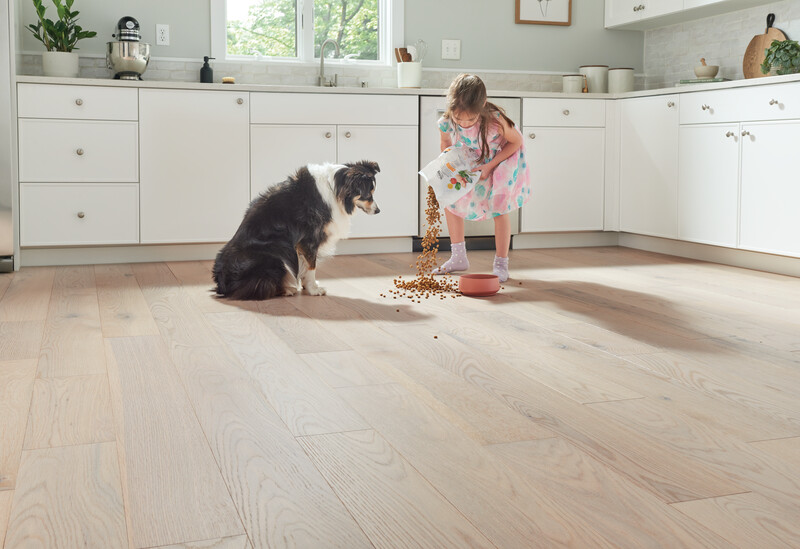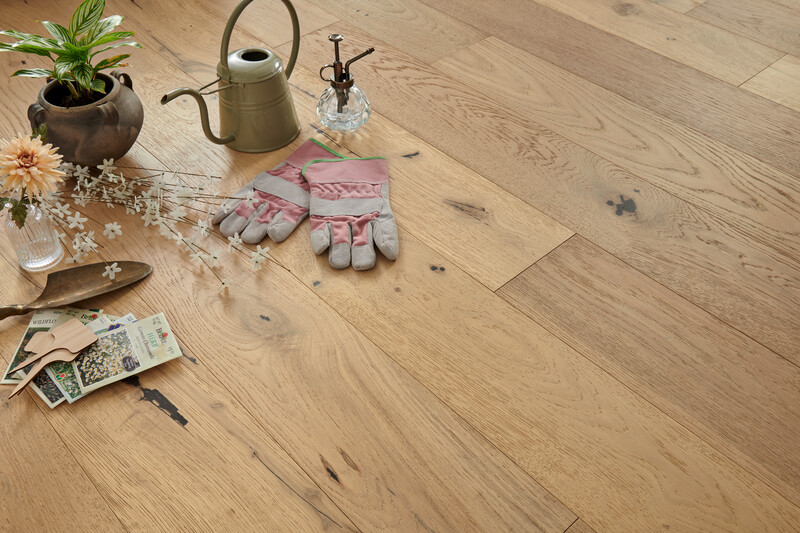Smart, Simple Hardwood Floor Care
April 7, 2025
Hardwood floors have always been one of the most popular features in homes, for good reason. They’re durable, beautiful, and never go out of style. But keeping them in top shape takes more than the occasional sweep. Daily habits, smart cleaning techniques, and the right products all work together to protect your investment.
The good news is that a few simple routines can go a long way. Knowing how to care for your floors properly makes all the difference. And when you pair good wood floor care with high-quality materials, you get floors that can withstand the rigors of real life for decades.

Start with Your Daily Wood Care Habits
Think of regular cleaning like brushing your teeth—it prevents minor problems from turning into larger ones. Daily quick steps can protect your floor surface, especially in high-traffic areas.
- Vacuum regularly with a model designed for hard surfaces (avoid the beater bar)
- Use a microfiber mop to trap fine dust without scratching
- Add area rugs or mats by entryways to catch dirt before it spreads
- Put felt pads on furniture legs to reduce impact and prevent scratching
- Keep pets’ nails trimmed to avoid marks and gouges
Adopting these habits will help your hardwoods stay cleaner for longer and reduce the need for heavy-duty cleaning later.
What to Avoid with Wood Floor Care — At All Costs
Some of the most common cleaning habits are also the most damaging. A product that promises a “natural shine” or a shortcut you saw online might do more harm than good.
Knowing what not to do is just as important as knowing what to do to make your hardwood floors last. Avoid these actions like the plague!
- Don’t use harsh chemicals, vinegar, or ammonia-based cleaning products
- Don’t use steam mops and anything that uses excessive water
- Stop dragging furniture instead of lifting it
- Take off your shoes instead of wearing cleats or high heels on wood floors
These can all dull your finish, scratch the floor, or even void your warranty. When in doubt, use a wood floor cleaner specifically made for hardwood.
Weekly Cleaning: Do It Right or Risk the Finish
Daily dusting keeps the surface clean, but your weekly cleaning routine protects the finish. Skip it, and dirt builds up. Do it wrong, and you risk dulling or damaging your floor.
This is where using the correct method—and the right products—matters most. Here’s how to deep clean your hardwood without causing harm:
- Use a hardwood floor cleaner made for your specific floor type
- Lightly spray it on your microfiber mop or directly on the floor
- Mop gently, following the grain
- Never leave standing water—excessive water can seep into seams and cause damage.
Cleaning hardwood floors doesn’t require fancy equipment; it just requires consistent effort and the right approach.

Accidents Happen: Spot Cleaning Tips for Wood Floors
Life happens—spilled juice, muddy paw prints, dropped snacks. Whether it’s kids, pets, or everyday chaos, your floors will inevitably take a hit from time to time. The key isn’t avoiding messes. You need to know how to handle them quickly, before they cause lasting damage.
- Wipe spills immediately with a dry or slightly damp cloth
- For sticky messes, reach for your go-to wood floor cleaner
- Always avoid letting moisture sit—it only takes a few minutes to soak in and cause trouble
Quick reactions prevent stains, buckling, and damage that can be expensive.
Know Your Floor: Solid vs. Engineered Hardwood
You can’t care for your wood floors if you don’t know what you’re standing on. Different types of hardwood have various limits, and what works for one might ruin the other.
- Solid hardwood flooring is precisely what it sounds like. The planks are made from a single solid piece of wood. The advantage? You can refinish multiple times over its life, typically four to six times.
- Engineered hardwood flooring has a wood surface and a stable, layered plywood core. The design accommodates shifts in moisture and temperature, making it ideal for basements, kitchens, or other areas with unpredictable conditions. However, you have limits to refinishing the surface, typically a couple of times.
Engineered wood options are water-resistant, but let’s be clear—they’re not waterproof. You should still avoid excessive water, steam, and harsh cleaning products. Good care begins with understanding your floor’s limitations.
Seasonal Shifts—Here’s How to Stay Ahead
Wood is a living material. It expands in humid conditions and contracts when the air gets dry.
Summer moisture can cause floorboards to swell if you live in the South. Dry winter air can cause gaps and cracks in the Midwest or Northeast. Even in milder climates, indoor heating and cooling systems can reduce your floor’s balance.
You can’t control the seasons, but you can control your home’s environment. Use a humidifier when the air is too dry and run a dehumidifier when it becomes muggy.
Aim to keep indoor humidity between 35% and 55% year-round to avoid stress on your floors. That simple step helps prevent warping, cupping, and other damage that sneaks in when the weather shifts.
Long-Term Hardwood Care: When to Recoat or Refinish
Even with great daily habits, your floor may eventually lose some shine. Your floor is fine—it just needs a little love.
With light wear and minor scuffs, you can consider recoating your hardwood. A fresh, new layer will protect your floors for many years to come.
With deeper scratches and gouges that show excessive wear, sanding and refinishing are your best bets. If done correctly, they’ll substantially extend the life of your wood floors.
As mentioned, depending on the thickness of the top wood layer, you can sometimes refinish engineered hardwood flooring. Before starting, check with a pro installer.
Start Strong with Quality Hardwood Flooring
All the hardwood floor care tips in the world will not help if you start with low-quality wood. Hartco® hardwood flooring is durable and offers long-term performance.
Most of our collections are manufactured in the United States. They use Appalachian hardwoods, renowned for their strength and distinctive grain patterns. Whether you choose solid or engineered hardwood flooring, Hartco provides floors built to last.
Hardwood Floor Care FAQs
How often should I clean my hardwood floors?
Dust or sweep daily, especially in high-traffic areas, and use a wood floor cleaner once a week for a deeper clean.
Can I use a wet mop on my hardwood floors?
No. Avoid excessive water—it can seep into the wood and cause damage. Use a microfiber mop that’s only slightly damp.
What cleaning products are safe for hardwood floors?
Stick with hardwood floor cleaners designed for your floor’s finish. Avoid oil soap, oil-based products, vinegar, or harsh chemicals.
Are Hartco floors pet-friendly?
Yes—but keep pets’ nails trimmed and clean up accidents immediately to avoid scratching or staining.
What’s the difference between solid and engineered hardwood?
Solid hardwood flooring is one solid piece and can be refinished multiple times. Engineered hardwood flooring has a layered base and, depending on the product, may have limited refinishing options.
Do I need to worry about humidity?
Yes. To prevent your floors from expanding, shrinking, or cupping, keep indoor humidity between 35% and 55% year-round.
